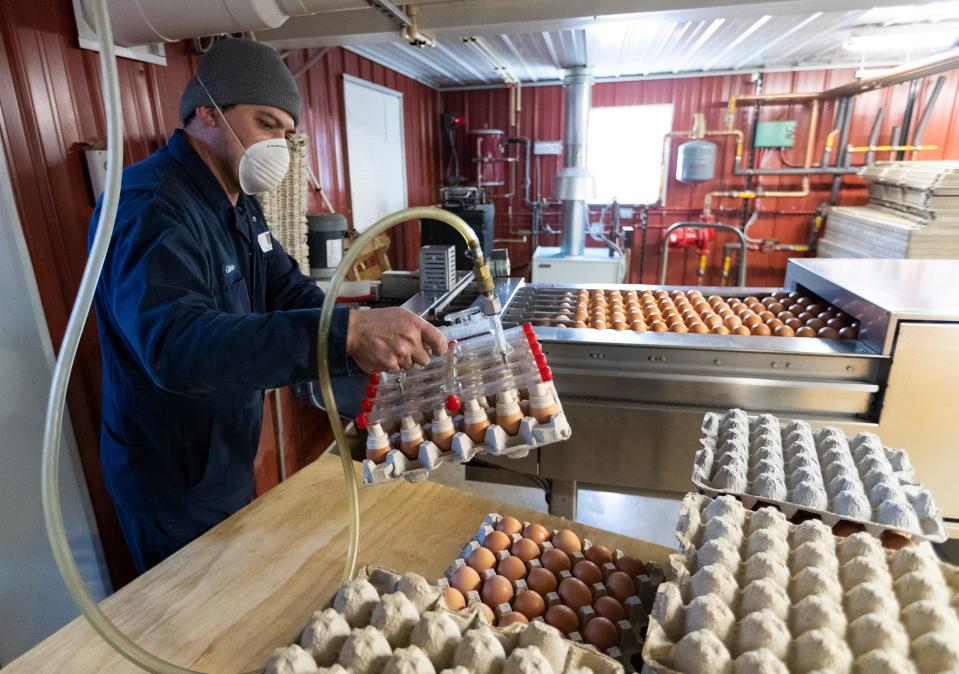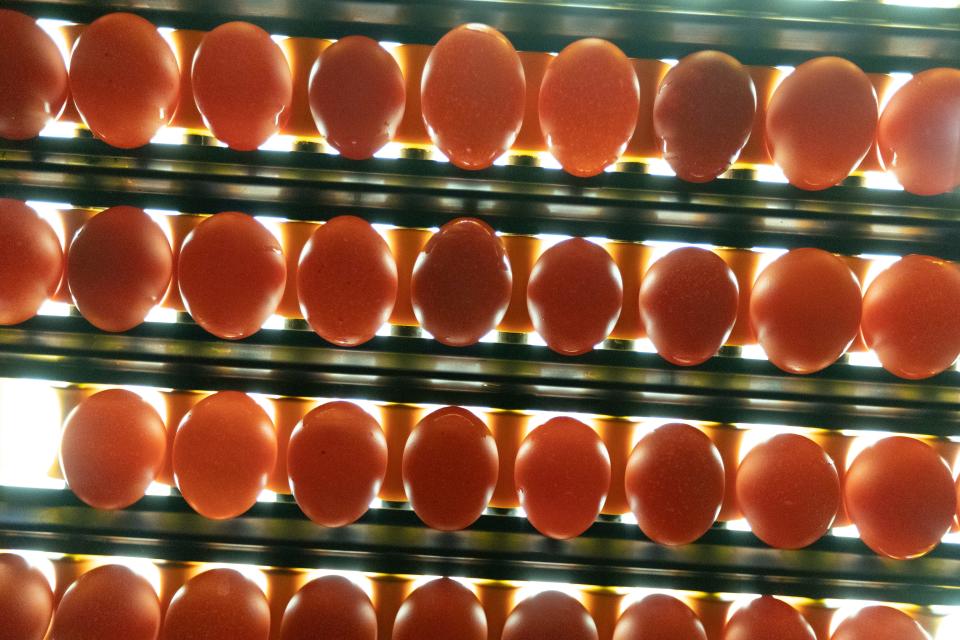Why are egg prices so expensive in Wisconsin and the rest of the country? There's one big reason.
Yuppie Hill Poultry farm in Burlington has been feeling the pressure from stores calling for more eggs.
“It’s very ugly,” Lynn Lein, owner of Yuppie Hill Poultry, said. “We’re not as big as those commercial guys. We're getting hammered hard.”
Egg inventories are down after millions of chickens nationwide were destroyed because of exposure to avian influenza. The reduced number of birds, combined with rising costs of feed, fuel, labor and more, the average price of a dozen eggs has more than doubled in the past year.
Yet demand hasn't been diminished by prices that average $3.99 a dozen in the Midwest and can go as high as $9 a dozen for specialty eggs.
Yuppie Hill Poultry has been trying to keep up with demand, but time is not on their side.
“People forget that a chicken lays one egg a day and it takes a dozen chickens to make one carton or eggs,” Lein said. “We only have so many chickens.”
Lein’s farm has roughly 40,000 cage free chickens, “which is a drop in the bucket compared to these big commercial guys,” she says adding the commercial farms could have as many as 1 million chickens.
Stores are doubling their orders with Yuppie Hill Poultry to try to keep the shelves stocked.
“It’s rough,” Lein said. “Everyone gets upset when we don’t have eggs and we’re doing our best, we’re trying to please everybody.”

What's the price of eggs in Wisconsin?
The egg-based punning has already been done to death, so let's cut to the chase: The price of eggs has hit historic highs.
Retail prices in the Milwaukee area now start at about $3 a dozen for large white eggs and can be as high as $8 or $9 a dozen for free range, organic and other specialty eggs.
That $3 a dozen price, if you can find it in stock, matches the national average advertised price reported by the U.S. Department of Agriculture on Jan.13.
The Woodman's store in Menomonee Falls, this week advertised a dozen Sauder's white cage free eggs for $2.99. Most of the store's prices were between $3.50 and $5 a dozen, topping out at $7.79 for a dozen organic, pasture-raised eggs from Vital Farms. Pick 'n Save on its website advertised eggs starting at $4.69 for a dozen Roundy's brand large white eggs and going up to $8.99 for Happy Egg Co.'s free range heritage breed eggs.
Why are eggs so expensive in Wisconsin?
The primary culprit behind the price hike is a highly pathogenic form of avian influenza, a deadly disease that experts say started in wild birds and began affecting chickens and other poultry early last year.
Chicken flocks have been hit particularly hard in the Midwest, led by Iowa where nearly 16 million birds have been destroyed, or "depopulated" in the parlance of the USDA. In Wisconsin, exposure to avian flu has resulted in the deaths of 3.3 million chickens.
Most of the chickens that were destroyed in Wisconsin, 2.75 million birds, were at a Jefferson County egg farm where the disease was identified in March.
No new infections have been reported in Wisconsin since November, when the disease was found in backyard flocks in Waukesha and Marathon counties. That's not helping local grocery store prices because they're still determined by what's going on in the rest of the Midwest and across the nation, where the disease continues to erupt sporadically and inflation has increased the price of feed, fuel and labor.
Lein said the avian flu has definitely had an impact in the costs going up.
"Those big houses have a million birds and there’s been a lot of houses that have been hit with this avian flu,” Lein said. "It’s going to take a while for those big commercial guys to repopulate their barns.”
But costs of feeding and maintaining the chickens have also gone up.
Yuppie Hill Poultry pays $7 for a bushel of corn, more than double what they normally pay, Lein said.
Like a lot of businesses, labor costs also have gone up. Lein said she isn't complaining about that.
"If you have good people willing to work then they deserve a good wage,” Lein said.
What happened to make the cost of eggs go up in Wisconsin?
In all, farmers have had to destroy more than 40 million birds, or about one-tenth of the 389 million chickens in the U.S. at the start of 2022.
Chicken flocks are still down 5% to 6%, said Lou Arrington, an emeritous professor of poultry sciences at University of Wisconsin-Extension who works with the Wisconsin Poultry & Egg Association. That may not seem a lot, but it has an outsized impact because demand for eggs is "inelastic" — it doesn't vary much as prices rise or fall, he said.
Bakeries and other food producers' need for eggs hasn't changed, and consumers have sucked it up and continue to pay prices that may make them gasp, Arrington said.
"I don't think the individual producer has a lot to say about it," he said of the nationwide forces that have driven up prices.
RELATED: Highly pathogenic avian influenza confirmed in Jefferson Co. flock
When will egg prices come down?
The Chicago-based American Egg Board in a statement said flocks are being steadily replenished and farmers are working to address sporadic shortages and ensure an adequate egg supply.
"While no one can predict the future, eggs sales have remained strong even with temporary price increases," the association said.
The current cost of eggs might be something consumers will have to get used to.
"This might be the new norm,” Lein said. "I don’t think the average consumer really realizes how much time and work, whether it’s commercial or medium size farm, how much time and work goes into getting that dozen eggs in the store.”
Lein said the drive from customers to buy eggs from cage free farms might also contribute to the rise in prices.
"It’s more labor intense, systems aren’t cheap and you can’t get as many chickens in the (cage free) barns,” Lein said.
That means cleaning the barns is more difficult and going from a cage barn to a cage free barn is not cheap.
"The cage free movement, in my opinion, it’s going to cost the commercial guys to turn their barns over," Lein said.

What do Wisconsin farmers say about the egg shortage?
Egg producers say no one is getting rich in this market, but there are some who expect to see long-term benefits from today's high prices.
It's not the big farms. Rather it's small local farmers like Michael Guetschenritter of Three Brothers Farm, a producer of organic, free range eggs near Oconomowoc.
Guetschenritter and his wife, Courney, have about 2,800 laying hens. They produce about 2,500 eggs a day that are sold through grocers in Waukesha and Milwaukee counties.
Their eggs had always been more expensive than the lowest-priced commodity eggs, but that changed as the national shortage drove up prices. Suddenly, the farm's eggs were "flying off the shelves" as the lowest-priced option in the stores, and a whole new group of customers was exposed to organic, locally produced eggs, Guetschenritter said.
"Those people now that they have our eggs in their house because they were the cheapest eggs on the shelf are seeing that the local organic egg is actually a better egg," Guetschenritter said. "We anticipate picking up more customers at the grocery store because of that."
That doesn't mean Guetschenritter has kept prices flat. He said he's raised prices 75 cents to $1 above the cheapest eggs both to account for a nearly 50% increase in the the cost of organic chicken feed and other rising costs and also to ensure store supplies last a couple more days.
Guetschenritter only delivers to stores on Wednesdays, and, before the price increase, the farm's loyal customers often found store stocks were sold out within a day.
"It's uncomfortable," Guetschenritter said of the decision to raise prices. "We small farmers tend to think more heavily on the ethics side and keeping our prices fair for the consumer. We're still doing that, but we also need to raise our price to stay in business. And we believe that our loyal customers are willing to pay that price."
Our subscribers make this reporting possible. Please consider supporting local journalism by subscribing to the Journal Sentinel at jsonline.com/deal.
DOWNLOAD THE APP: Get the latest news, sports and more
This article originally appeared on Milwaukee Journal Sentinel: Why are egg prices so expensive in Wisconsin? Avian flu to blame.
